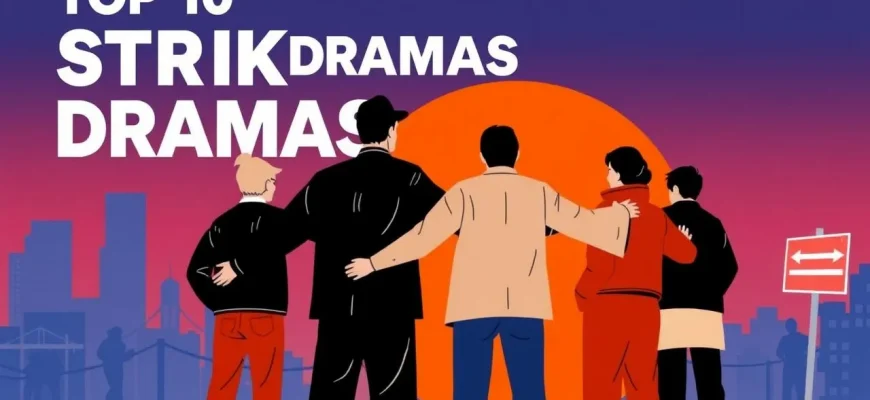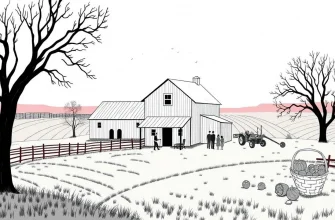Strikes have always been a powerful tool for workers to voice their demands and fight for their rights. These films not only entertain but also shed light on the struggles, solidarity, and sometimes the dark side of labor movements. Here's a curated list of 10 dramatic films that capture the essence of strikes, offering both historical insights and emotional depth.

The Grapes of Wrath (1940)
Description: While not directly about a strike, this adaptation of Steinbeck's novel captures the desperation of the Dust Bowl migrants and their collective action against exploitation, embodying the spirit of labor movements.
Fact: Henry Fonda's portrayal of Tom Joad earned him an Academy Award nomination, and the film was directed by John Ford.
 Watch Now
Watch Now 
Salt of the Earth (1954)
Description: This groundbreaking film was blacklisted during the McCarthy era for its depiction of a miners' strike in New Mexico, focusing on the role of women in the labor movement.
Fact: It was directed by Herbert J. Biberman, one of the Hollywood Ten, and was made with a cast and crew that included many blacklisted artists.
 Watch Now
Watch Now 
The Pajama Game (1957)
Description: This musical comedy-drama revolves around a strike at a pajama factory, blending romance with labor issues in a light-hearted yet insightful manner.
Fact: The film was adapted from a successful Broadway musical and features songs by Richard Adler and Jerry Ross.
 Watch Now
Watch Now 
The Molly Maguires (1970)
Description: Set in the 1870s, this film follows the secret society of Irish coal miners in Pennsylvania who use violent means to fight against the oppressive coal companies. It's a gritty portrayal of labor unrest and the lengths to which workers will go for justice.
Fact: The film was shot on location in Eckley, Pennsylvania, which was once a real coal mining town.
 Watch Now
Watch Now 
The Killing Floor (1984)
Description: Set during World War I, this film follows a black sharecropper who moves to Chicago and gets involved in the stockyards' labor movement, highlighting racial tensions and union struggles.
Fact: The film was part of the PBS American Playhouse series, which aimed to bring diverse American stories to the screen.
 Watch Now
Watch Now 
The Organizer (1963)
Description: Set in Turin, Italy, this film follows a professor who organizes a strike among textile workers, showcasing the complexities and challenges of labor organizing.
Fact: The film was directed by Mario Monicelli, known for his satirical takes on Italian society, and was nominated for the Palme d'Or at Cannes.
 30 Days Free
30 Days Free 
Harlan County, USA (1976)
Description: A documentary that captures the 1973 strike of coal miners in Kentucky, this film provides a raw, unfiltered look at the harsh realities of labor disputes.
Fact: It won the Academy Award for Best Documentary Feature, and director Barbara Kopple was physically attacked during the filming.
 30 Days Free
30 Days Free 
Norma Rae (1979)
Description: This film tells the story of a Southern textile worker who becomes a union activist, leading her fellow workers in a strike for better working conditions. It's a poignant look at the personal sacrifices and triumphs of labor activism.
Fact: Sally Field won an Academy Award for Best Actress for her role as Norma Rae. The film was inspired by the real-life story of Crystal Lee Sutton.
 30 Days Free
30 Days Free 
Matewan (1987)
Description: This film depicts the 1920 Matewan Massacre, where coal miners, both black and white, unite against the company's attempts to break their strike. It's a testament to the power of unity across racial lines in the fight for workers' rights.
Fact: The film was directed by John Sayles, who also wrote the screenplay, and it was shot in West Virginia, where the actual events took place.
 30 Days Free
30 Days Free 
Bread and Roses (2000)
Description: Focused on the Justice for Janitors campaign in Los Angeles, this film explores the lives of immigrant workers fighting for better wages and conditions. It's a modern take on labor struggles with a focus on the human stories behind the movement.
Fact: The film was co-written by Paul Laverty, who often collaborates with director Ken Loach on social issue films.
 30 Days Free
30 Days Free 








